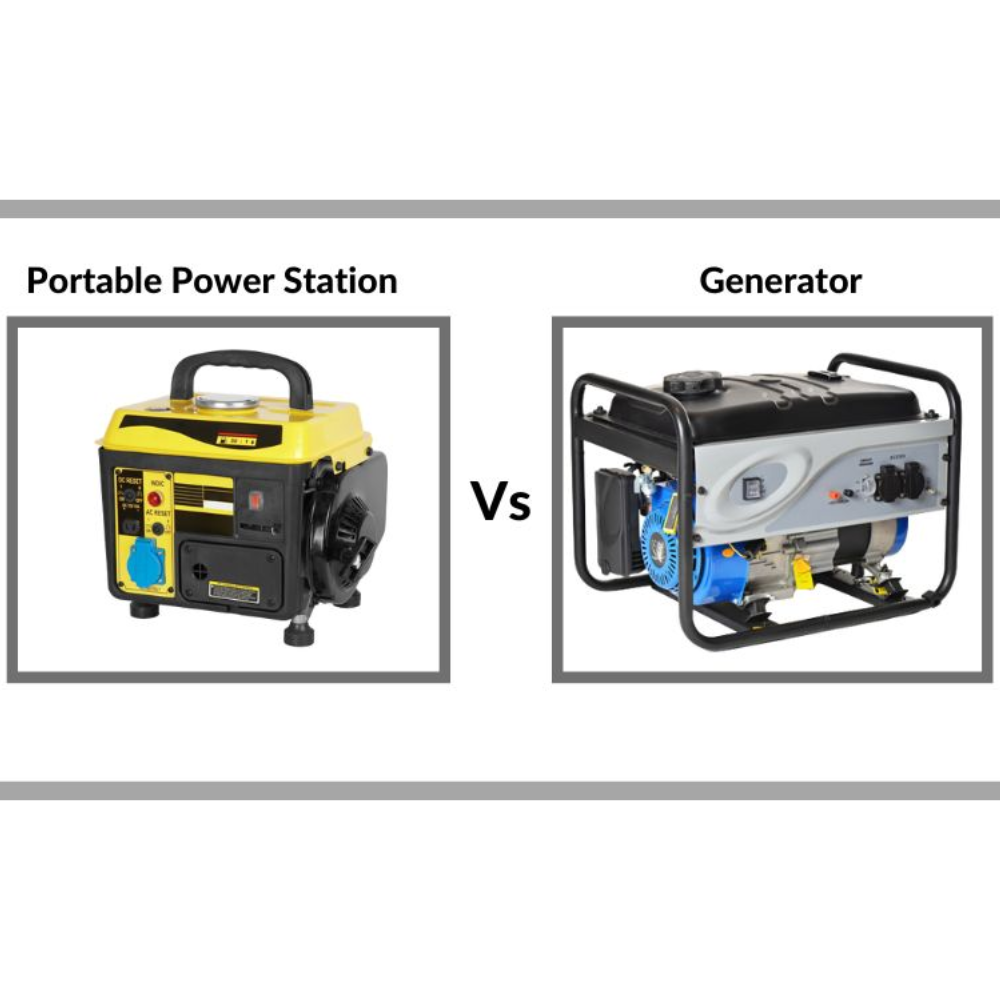Portable power stations and generators are both reliable sources of emergency backup power, especially during prolonged power outages. However, they differ in their design, function, and capabilities.
A portable power station is a compact unit equipped with batteries and an inverter to store and convert energy from solar panels or wall outlets. On the other hand, traditional generators run on fuel such as gasoline or propane to produce electricity.
In this comparison guide, we will explore the differences between portable power stations and generators to help you determine which one suits your needs better. We will discuss their features, pros and cons, applications, and maintenance requirements.
What Is a Portable Power Station?

A portable power station, also known as a battery-powered generator or a solar generator, is a compact and lightweight device that provides electricity through a rechargeable battery. It is designed to be easily transported and used in various settings, making it ideal for camping, outdoor activities, and emergency backup power.
Unlike traditional generators, which rely on fossil fuels to produce electricity, portable power stations use renewable energy sources such as solar panels or wall outlets to charge their batteries. They are also equipped with an inverter to convert the stored energy into usable AC power.
Portable power stations come in different sizes and capacities ranging from small handheld devices to larger units that can provide enough power for household appliances. Some models also have additional features such as USB ports, LED lights, and wireless charging capabilities.
What Is a Generator?

A generator is a device that converts mechanical energy into electrical energy. It contains an engine that runs on fuel such as gasoline, diesel, or propane, which powers an alternator to produce electricity. Generators come in various sizes and types, from small portable units to large industrial generators.
Unlike portable power stations, which can be recharged with renewable energy sources, generators rely on fossil fuels to operate. This makes them less environmentally friendly and more expensive to run compared to portable power stations.
However, generators have a higher power output and can provide continuous electricity for longer periods. They are commonly used as backup power sources for homes and businesses during blackouts or in remote areas without access to the grid.
Comparison between Portable Power Stations vs Generators

Both portable power stations and generators serve the same purpose of providing backup power, but they differ significantly in their design and function. Here are some key differences to consider when choosing between the two:
Portability
Portability is one of the standout features when comparing portable power stations and generators. Portable power stations are designed for easy transport, typically featuring lightweight constructions and ergonomic handles.
This makes them suitable for activities like camping, tailgating, or road trips. In contrast, traditional generators can be bulky and heavy, often requiring wheels for mobility. While some portable generators have also been designed with portability in mind, they usually sacrifice weight for power.
Users often find it cumbersome to haul larger generators to remote locations. Therefore, for those prioritising lightweight and convenient energy solutions, portable power stations offer a clear advantage when it comes to portability.
Fuel Source
As mentioned earlier, portable power stations rely on renewable energy sources such as solar panels or wall outlets for charging their batteries. This makes them more environmentally friendly and cost-effective to run compared to traditional generators that consume fossil fuels.
However, during extended periods of cloudy weather or power outages, the availability of solar energy can be limited. In such cases, portable power stations may need to be charged using a wall outlet, which could increase electricity bills.
On the other hand, generators run on fossil fuels and can provide continuous electricity for longer periods. This makes them more suitable for heavy-duty applications that require high power output and extended runtime.
Noise Level
Portable power stations are known for their quiet operation since they do not have an engine or moving parts like traditional generators. The only noise you'll hear is from internal fans used to cool down the batteries while charging.
Generators, on the other hand, are notorious for their loud operation due to their gasoline or diesel engines. The noise level can be a major concern, especially in residential areas or campgrounds where generators are often used.
However, some newer models of generators have been designed with noise-reduction technology, making them quieter than traditional generators. Nevertheless, portable power stations still offer a clear advantage when it comes to noise levels.
Maintenance Requirements
Another factor to consider when comparing portable power stations and generators is the maintenance required. Portable power stations require minimal maintenance since they do not have an engine that needs oil changes or tune-ups.
On the other hand, traditional generators require regular maintenance such as changing oil and air filters, and checking spark plugs, which can be time-consuming and costly.
However, it's worth mentioning that portable power stations have a limited lifespan due to their rechargeable batteries. These batteries will eventually need to be replaced after several years of use, which can also incur additional costs.
Emissions
One of the biggest advantages of portable power stations over generators is their zero emissions. Since they do not rely on fossil fuels for operation, they produce no harmful emissions or pollution.
In contrast, traditional generators emit pollutants such as carbon monoxide and nitrogen oxides, which are harmful to both humans and the environment. This makes them unsuitable for indoor use or in areas with poor air quality.
Power Output and Runtime
When it comes to power output and runtime, generators have a clear advantage over portable power stations. Generators can provide much higher power output for extended periods, making them ideal for heavy-duty applications such as powering appliances or construction equipment.
In comparison, portable power stations usually have lower power output and limited runtime due to their battery capacity. This makes them more suitable for charging small electronic devices like phones, laptops, and lights.
However, some newer models of portable power stations are designed with expandable battery packs or the ability to connect multiple units together for increased power output and longer runtimes. This blurs the line between the two and makes portable power stations a viable option for larger power needs.
So, these are the key differences between portable power stations and generators. Ultimately, the best choice will depend on your specific needs and preferences.
Applications Of Portable Power Stations And Generators
Both portable power stations and generators have a wide range of applications. Here are some common use cases for each:
Portable Power Stations
- Outdoor activities such as camping, hiking, or tailgating
- Emergency backup power during power outages, natural disasters, or remote locations without access to electricity
- Charging electronic devices like phones, laptops, cameras, and lights while on the go
- Powering small appliances like fans or mini-fridges for temporary use
Generators
- Providing backup power during extended power outages or natural disasters
- Powering construction equipment or tools at job sites without access to electricity
- Supplying electricity for large events or outdoor activities with high power needs
- Running essential appliances like refrigerators, heaters, or air conditioners during power outages.
Both portable power stations and generators offer their unique benefits and can be useful in different scenarios. Consider your specific energy needs and choose the option that best fits your requirements.
How To Choose Between Portable Power Stations And Generators
When deciding between a portable power station and a generator, there are some key factors to consider. Here are some questions to ask yourself to help make the decision:
- What will be your primary use for the power source?
- Do you need high power output or longer runtime?
- Will noise levels be a concern for your intended use?
- How important is portability for your needs?
- Are you looking for an environmentally friendly and cost-effective option?
Based on your answers, you can determine which option suits your needs better. If you require higher power output and longer runtimes, then a traditional generator may be the better choice. But if you value quiet operation, low maintenance, and eco-friendliness, a portable power station may be the better option.
In some cases, it may even be beneficial to have both a portable power station and a generator for different use cases. Ultimately, the decision between the two will depend on your specific energy needs and priorities.
How Much Budget Is Required For Portable Power Stations And Generators

The cost of portable power stations and generators can vary depending on the brand, model, and features. In general, portable power stations tend to be more expensive upfront than traditional generators.
Portable power stations can range from $100 to over $1000, with higher-end models offering more features and longer runtimes. On the other hand, traditional generators can range from a few hundred dollars for small units to several thousand dollars for larger ones.
However, it's important to also consider long-term costs such as maintenance and replacement of batteries or engine parts. While portable power stations may have higher upfront costs, they require minimal maintenance compared to traditional generators, which may save you money in the long run.
Ultimately, your budget will play a significant role in determining which option is best for you. Consider your energy needs and budget constraints carefully before making a decision. It may also be helpful to compare prices and features of different brands and models to find the best value for your money.
FAQs
What is the difference between a portable power station and a portable generator?
A portable power station typically uses a rechargeable battery to provide electrical power, whereas a portable generator generates electricity by burning fuel like gasoline or propane. Portable power stations run quieter and are more eco-friendly, while portable generators offer a more continuous power supply as long as they have fuel.
Can a portable power station replace a portable generator as a backup power source?
Many portable power stations can serve as a backup power source, especially for smaller electrical devices and short-term power needs. However, for longer durations or powering larger appliances, a portable generator might be a more reliable option due to its ability to generate electricity continuously as long as fuel is available.
How do portable power stations run compared to portable generators?
Portable power stations run on stored battery power, making them quieter and more environmentally friendly than portable generators, which rely on fuel to generate electricity. While portable power stations provide a cleaner power supply, they may have limitations in terms of power output and duration compared to portable generators.
Are portable power stations better for indoor use compared to portable generators?
Yes, portable power stations are generally better suited for indoor use because they do not produce emissions or noise, unlike portable generators, which must be used outdoors due to the fumes and noise generated while producing electrical power.
How many electrical devices can a portable power station support compared to a portable generator?
Many portable power stations have multiple AC outlets and USB ports, allowing them to support several electrical devices simultaneously, although their capacity is usually lower than that of portable generators. Portable generators typically provide a more robust power supply, suitable for running larger and more energy-intensive devices.
Conclusion
Both portable power stations and generators have their pros and cons, making them suitable for different situations. Portable power stations offer eco-friendliness, portability, and low maintenance, while generators provide higher power output and runtime.
When choosing between the two, consider your energy needs, budget, and priorities to make an informed decision. With advancements in technology, we can expect both options to continue evolving and offering even more versatile solutions for our energy needs in the future.
So keep exploring your options when it comes to portable power sources to find the best fit for you! With advances in technology, we can only expect more versatile and efficient solutions to our energy needs in the future.
Subscribe to our email newsletter and unlock access to members-only content and exclusive updates.

Comments